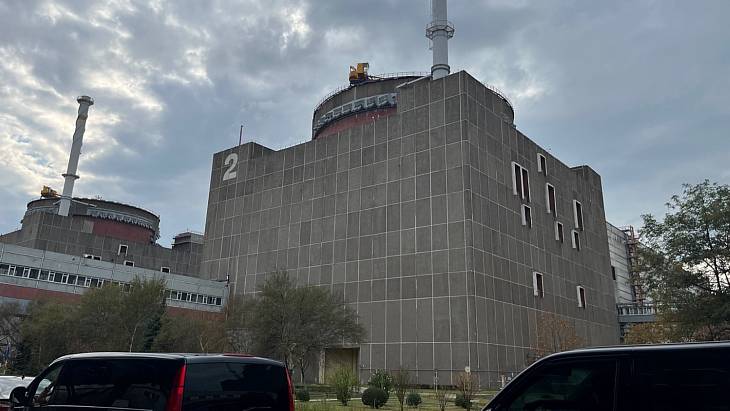Grossi's appeal over delay to IAEA staff rotation at Zaporizhzhia
21 February 2023
The planned rotation of the three International Atomic Energy Agency (IAEA) Support and Assistance Mission to Zaporizhzhia (ISAMZ) staff has now been delayed for more than two weeks, with Director General Rafael Mariano Grossi urging both sides to help facilitate the change in experts at the site.
 The first IAEA team of experts was established at Zaporizhzhia in September (Image: IAEA)
The first IAEA team of experts was established at Zaporizhzhia in September (Image: IAEA)
There have been ISAMZ staff present at Ukraine's six-reactor Zaporizhzhia nuclear power plant for nearly six months. The plant is on the frontline of the war and has been occupied by Russian forces since early March 2022, although it has continued to be operated by its Ukrainian staff.
The three ISAMZ experts - the fifth team at the plant - have been there since early January and were due to be replaced by a fresh team more than a fortnight ago. The in-bound team are already in Ukraine. During rotations of staff, the IAEA teams have to cross the frontline between Ukrainian and Russian-controlled territory.
Grossi said: "The nuclear safety and security situation in Ukraine - especially at the Zaporizhzhia nuclear power plant - continues to be dangerous and unpredictable. ISAMZ has been playing a key role in helping to protect this major nuclear facility - with its six reactors - during the war. Their presence is contributing to the maintenance of nuclear safety and security, which is in everybody's interest. The agency is doing everything it can to conduct the safe rotation of our staff there as soon as possible. Their safety and security are my top priority."
Grossi said of the statements about the stalled rotation by the two sides, that "while these reflect their opposing views about the situation, it is important to approach this in a practical spirit bearing in mind the importance of the mission, for people in Ukraine and beyond".
He added that the IAEA staff, alongside the existing Zaporizhzhia nuclear power plant staff, "have won the respect and admiration of the wider international community. We can all be very grateful for the work they are doing in extremely difficult and challenging circumstances. We must all help ensure that they can continue to implement this crucial nuclear safety and security mission".
With the approach of the first anniversary of Russia launching its military action in Ukraine, there continues to be concern about ensuring the safety of all Ukraine's nuclear power plants - Ukraine reported missiles flew near the South Ukraine nuclear power plant and there has been the sound of artillery fire taking place close to the Zaporizhzhia nuclear power plant.
Grossi has been attempting to establish a safety and security zone at and around the Zaporizhzhia plant to try to reduce the risk of it being damaged during the war. However, although both sides agree on the idea in principle, there has not been an agreement on the details, such as the size of the zone, and what is allowed within the zone.
Grossi, who visited Ukraine and Russia earlier this month, said: "I will continue my diplomatic efforts until the zone is established. Virtually every day, we are reminded of the necessity of more protective measures for the Zaporizhzhia nuclear power plant."
A similar IAEA team at Chernobyl underwent a successful staff rotation at the weekend, and those at the South Ukraine, Khmelnitsky and Rivne nuclear power plants have scheduled rotations in the coming weeks.
Researched and written by World Nuclear News